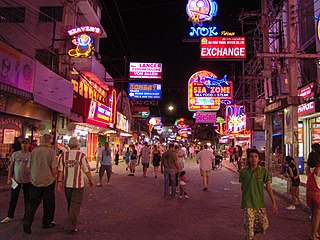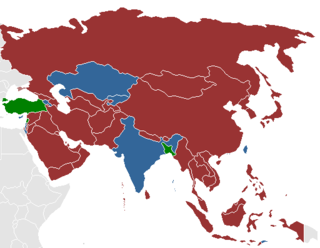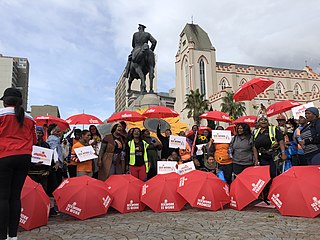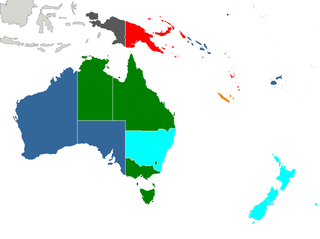
A sex worker is a person who provides sex work, either on a regular or occasional basis. The term is used in reference to those who work in all areas of the sex industry.

Sex work is "the exchange of sexual services, performances, or products for material compensation. It includes activities of direct physical contact between buyers and sellers as well as indirect sexual stimulation". Sex work only refers to voluntary sexual transactions; thus, the term does not refer to human trafficking and other coerced or nonconsensual sexual transactions such as child prostitution. The transaction must take place between consenting adults of the legal age and mental capacity to consent and must take place without any methods of coercion, other than payment. The term emphasizes the labor and economic implications of this type of work. Furthermore, some prefer the use of the term because it grants more agency to the sellers of these services.

Prostitution in Thailand is illegal. However, due to police corruption and an economic reliance on prostitution dating back to the Vietnam War, it remains a significant presence in the country. It results from poverty, low levels of education and a lack of employment in rural areas. Prostitutes mostly come from the northeastern (Isan) region of Thailand, from ethnic minorities or from neighbouring countries, especially Cambodia, Myanmar, and Laos. UNAIDS in 2019 estimated the total population of sex workers in Thailand to be 43,000.

Prostitution is legal in India, but a number of related activities including soliciting, kerb crawling, owning or managing a brothel, prostitution in a hotel, child prostitution, pimping and pandering are illegal. There are, however, many brothels illegally operating in Indian cities including Mumbai, Delhi, Kolkata, Bangalore, and Chennai. UNAIDS estimate there were 657,829 prostitutes in the country as of 2016. Other unofficial estimates have calculated India has roughly 3–10 million prostitutes. India is widely regarded as having one of the world's largest commercial sex industry. It has emerged as a global hub of sex tourism, attracting sex tourists from wealthy countries. The sex industry in India is a multi-billion dollar one, and one of the fastest growing.
Bay Area Sex Worker Advocacy Network (BAYSWAN) is a non-profit organization in the San Francisco Bay Area which works to improve working conditions, increase benefits, and eliminate discrimination on behalf of individuals working within both legal and criminalized adult entertainment industries. The organization provides advice and information to social service, policy reformers, media outlets, politicians, including the San Francisco Task Force on Prostitution and Commission on the Status of Women (COSW), and law enforcement agencies dealing with sex workers.
Prostitution in Guatemala is legal but procuring is prohibited. There is an offence of “aggravated procuring” where a minor is involved. Keeping a brothel is not prohibited.
Prostitution in South Africa is illegal for both buying and selling sex, as well as related activities such as brothel keeping and pimping. However, it remains widespread. Law enforcement is poor.
International Day to End Violence Against Sex Workers is observed annually on December 17 by sex workers, their advocates, friends, families and allies. Originally conceived as a memorial and vigil for the victims of the Green River Killer in Seattle, Washington, US, it has evolved into an annual international event. The day calls attention to hate crimes committed against sex workers worldwide, as well as the need to remove the social stigma and discrimination that have contributed to violence against sex workers and indifference from the communities they are part of. Sex worker activists also state that custom and prohibitionist laws perpetuate such violence.

Sex workers' rights encompass a variety of aims being pursued globally by individuals and organizations that specifically involve the human, health, and labor rights of sex workers and their clients. The goals of these movements are diverse, but generally aim to legalize or decriminalize sex work, as well as to destigmatize it, regulate it and ensure fair treatment before legal and cultural forces on a local and international level for all persons in the sex industry.

Prostitution in Ukraine is illegal but widespread and largely ignored by the government. In recent times, Ukraine has become a popular prostitution and sex trafficking destination. Ukraine is a source, transit, and destination country for women and children trafficked transnationally for the purposes of commercial sexual exploitation. Ukraine's dissolution from the Soviet Union, saw the nation attempt to transition from a planned economy to a market economy. The transition process inflicted economic hardship in the nation, with nearly 80% of the population forced into poverty in the decade that followed its independence. Unemployment in Ukraine was growing at an increasing rate, with female unemployment rising to 64% by 1997. The economic decline in Ukraine made the nation vulnerable and forced many to depend on prostitution and trafficking as a source of income. Sex tourism rose as the country attracted greater numbers of foreign tourists.
Prostitution in El Salvador is not prohibited by national law, but may be prohibited by local municipal ordinances. Municipal ordinances may also prohibit the purchase of sexual services. Related activities such as facilitating, promoting or giving incentives to a person to work as a prostitute (pimping) are illegal. The prostitution of children is also illegal. Brothel ownership, however, is legal. There are no specific laws against human trafficking, but any criminal offence that includes ‘commerce in women or children’ requires sentencing to be increased by 30%.
Robyn Few was an American sex workers' rights activist who worked for the decriminalization of prostitution, against violence targeted at sex workers, and, generally, for the improvement of sex workers' working conditions. A former prostitute, she founded and directed the Sex Workers Outreach Project USA (SWOP-USA), and helped organize the annual International Day to End Violence Against Sex Workers. She was born in Paducah, Kentucky.

Prostitution laws varies widely from country to country, and between jurisdictions within a country. At one extreme, prostitution or sex work is legal in some places and regarded as a profession, while at the other extreme, it is considered a severe crime punishable by death in some other places.
Human trafficking in Nepal is a growing criminal industry affecting multiple other countries beyond Nepal, primarily across Asia and the Middle East. Nepal is mainly a source country for men, women and children subjected to the forced labor and sex trafficking. U.S. State Department's Office to Monitor and Combat Trafficking in Persons placed the country in "Tier 2" in 2017.
Prostitution in Kyrgyzstan has been legal since 1998, but the operation of brothels, pimping, and recruiting persons into prostitution are illegal, with penalties of up to five years There are estimated to be 7,100 sex workers in the country. Prostitution occurs on the streets, in bars, hotels and brothels.

The decriminalization of sex work is the removal of criminal penalties for sex work. Sex work, the consensual provision of sexual services for money or goods, is criminalized in most countries. Decriminalization is distinct from legalization.

Prostitution in Oceania varies greatly across the region. In American Samoa, for instance, prostitution is illegal, whereas in New Zealand most aspects of the trade are decriminalised.
Ayanda Denge was a South African trans woman and sex trafficking survivor. She was an advocate for transgender people, sex trafficking survivors, and for the abolition of prostitution. She was the chairperson of the Sex Workers Education and Advocacy Taskforce (SWEAT). Denge has said that, "being transgender is ... a triple dose of stigmatisation and discrimination".
Prostitution in California is illegal. As of 2022, prostitution is considered a misdemeanor.
There are about 220,000 women currently incarcerated in America. Over 30% of these women are convicted prostitutes. Much of the research on the sex industry in prisons focuses on the experiences of women because the number of jailed female sex workers greatly outnumbers men. Prominent issues that the criminal justice system and women who are incarcerated on prostitution charges currently face include the sexually transmitted infections and diseases epidemic, the sex-work-prison cycle, and the prison-to-sex-trafficking pipeline. Intervention and diversion programs, both within prisons and in traditional and specialty courts aim to address these issues, decrease recidivism, and provide these women with resources to assist them in exiting the sex trade. There are a variety of community-based organizations which seek to help resolve these concerns.









